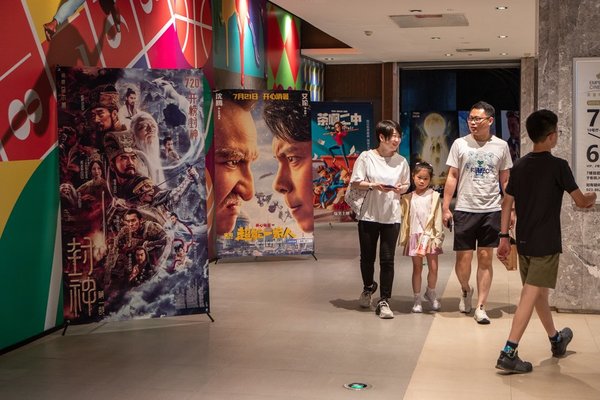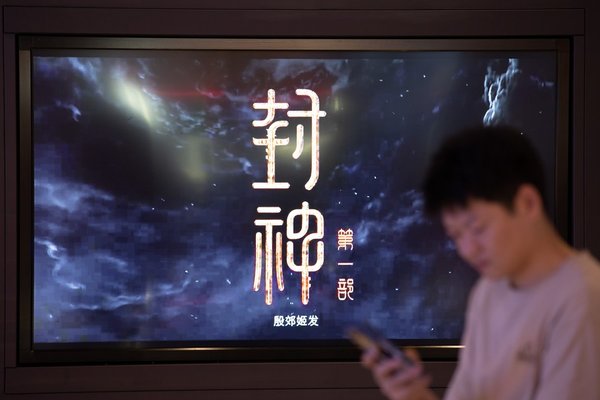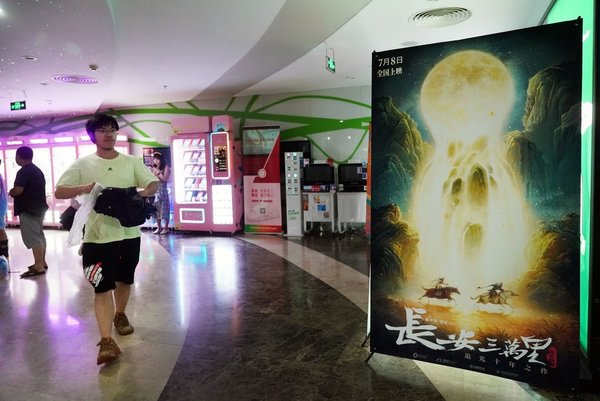Domestic Movies Lead Strong Film Market Recovery in China
 |
| Click the photo and watch the video. |
* For over a consecutive week, "Creation of the Gods I: Kingdom of Storms," a domestic fantasy film, has dominated the Chinese mainland's box office chart, raking in over 1.1 billion yuan (about 154 million U.S. dollars) as of Sunday.
* As of Sunday, four of the five highest-grossing films during this year's summer movie season were domestic productions, earning over 8 billion yuan in total, according to Dengta Data.
* "Chang An," the third highest-grossing film so far during the summer season, beautifully explores the theme of passing down a cultural legacy through generations. The animated film tells the stories of the brilliant poet Li Bai, also known as the "Immortal Poet" in China, from the perspective of a friend of his.
* "The focus on the lives of ordinary people and their strong connection to traditional culture, deeply ingrained among the Chinese population, reflect proactive efforts in the subject selection for Chinese films. These factors contribute to the greater appeal of domestic films to Chinese audiences compared to foreign films," said Yang Xindi, a researcher from the Beijing Film Academy.
BEIJING, July 31 (Xinhua) — For over a consecutive week, "Creation of the Gods I: Kingdom of Storms," a domestic fantasy film, has dominated the Chinese mainland's box office chart, raking in over 1.1 billion yuan (about 154 million U.S. dollars) as of Sunday, with this past weekend alone contributing more than 310 million yuan to its overall earnings.
 |
| People walk past film posters outside a cinema in Yubei District of Chongqing, southwest China, July 30, 2023. [Xinhua/Chu Jiayin] |
Amidst the robust post-COVID recovery of China's film industry, "Kingdom of Storms" stands out as a noteworthy "made-in-China" blockbuster. Boasting a considerable budget and an ensemble of renowned Chinese mythology figures portrayed by top actors, this film has captured the attention of audiences. Nonetheless, it is not the sole domestic production to triumph in this year's thriving summer movie season. The Chinese film industry has witnessed several successful releases during this period of resurgence.
Audience Favor Domestic Films
According to box office tracker Dengta Data, the mainland's box office revenue for the summer movie season that started on June 1 had exceeded 12.6 billion yuan as of Sunday, nearly 3 billion yuan more than the figure for the same period in 2019 before the outbreak of COVID-19.
 |
| Audiences select seats at a cinema in Shanghai, east China, July 30, 2023. [Xinhua/Xin Mengchen] |
However, the two Hollywood blockbusters "Mission: Impossible — Dead Reckoning Part One" and "Barbie," both released on the Chinese mainland around the same time as in the United States, have fallen short of expectations in terms of performance.
The 7th installment of Tom Cruise's "Mission: Impossible" franchise has only grossed about 330 million yuan since its release on the Chinese mainland on July 14. The fantasy comedy "Barbie," despite being discussed widely on Chinese social networks, has earned over 180 million yuan since it was released on July 21.
As of Sunday, four of the five highest-grossing films during this year's summer movie season were domestic productions, earning over 8 billion yuan in total, according to Dengta Data. The four domestic films, including "Kingdom of Storms," represent a diverse range of genres.
The top-grosser "Lost in the Stars" is a suspense crime film about a woman mysteriously disappearing while on an overseas trip with her husband. The drama "Never Say Never" tells the story of a former boxer who decides to train orphans from rural places to give them a future. The animated film "Chang An" focuses on famous poets and poems from the Tang Dynasty (618-907).
"Instead of saying that we see various types of films this summer, I'd rather say that we can see more pronounced characteristics of different film genres from domestic commercial films, which is certainly positive for the development of the film industry," said Yang Xindi, a researcher from the Beijing Film Academy.
"As China's domestic films have more diverse subjects and more distinct genres, with the overall development of film industrialization, they are obviously becoming more attractive to the Chinese audience," Yang added.
Chinese Culture in Industrialized Films
"Kingdom of Storms" is the first installment of a trilogy based on the household Chinese fantasy novel "Investiture of the Gods," which features mythology stories taking place between ancient China's Shang Dynasty (1600-1046 B.C.) and Western Zhou Dynasty (1046-771 B.C.) involving historical figures such as apotheosized strategist Jiang Ziya, fox spirit Da Ji, and Shang's last king Zhou.
 |
| A man buys film ticket with a cellphone in Xiangfang District of Harbin, northeast China's Heilongjiang Province, July 30, 2023. [Xinhua/Zhang Tao] |
The trilogy is not the first adaptation of the classic, which has inspired dozens of films, dramas and mangas in China and even in Japan and Singapore, but possibly the most ambitious attempt.
According to the director Wuershan, the whole filming procedure of the trilogy lasted 18 months with the participation of thousands of crew members. The trilogy has over 1,700 visual effect scenes, which were produced by eight companies from across the world. "We can say that our working specifications and procedures were internationally advanced," said Wuershan in a recent interview with the People's Daily.
On China's leading film rating platform Douban, "Kingdom of Storms" has a rating of 7.8 out of 10 so far, higher than 90 percent of fantasy films listed on the site. "I already had this epic feel about the film in the first 15 minutes of screening," one of the most-liked comments on Douban read. "The scenes of the siege were magnificent and the sound effects of thousands of arrows being shot at once were so impressive. As a commercial film, it is satisfyingly entertaining."
According to Wuershan, the film has skillfully adapted certain plot elements from the original stories in "Investiture of the Gods" to better resonate with audiences, while still preserving the essence and core of those stories. "The key reason why a mythology is being told again and again over thousands of years is that it contains the most precious spiritual legacy and emotions belonging to the Chinese civilization," he added. "It carries our nation's cultural code."
"Chang An," the third highest-grossing film so far during the summer season, beautifully explores the theme of passing down a cultural legacy through generations. The animated film tells the stories of the brilliant poet Li Bai, also known as the "Immortal Poet" in China, from the perspective of a friend of his. It features 48 well-known poems from the Tang Dynasty, some of which have been taught at schools and recited by students across the country, and has struck a chord with a wide range of young audiences.
 |
| A poster of film "Chang An" is seen at a cinema in Haidian District of Beijing, capital of China, July 30, 2023. [Xinhua/Ren Chao] |
"Despite being nearly three hours long, the film kept me hooked," said a 21-year-old student Wu Qianli after watching the film. Released on July 8, "Chang An" is rated 8.2 out of 10 on Douban and has raked in over 1.5 billion yuan, becoming the fourth highest-grossing animated film screened on the mainland ever, according to Dengta Data.
Jiang Zhulang, a scholar at the Communication University of China, lauded "Chang An" as "beyond expectations." "The film is different from numerous other domestic animated films in that it is not a subjective imagination of ancient mythology and gods. The production team did their best to explore the essence of the culture and social life in the Tang Dynasty and attract audiences of different ages with a vivid and lively narrative," Jiang said.
"The focus on the lives of ordinary people and their strong connection to traditional culture, deeply ingrained among the Chinese population, reflect proactive efforts in the subject selection for Chinese films. These factors contribute to the greater appeal of domestic films to Chinese audiences compared to foreign films," Yang Xindi said.
She went on to add that domestic films need to continue prioritizing subjects that align with the audience's interests and demands.
Video reporters: Hong Jing, Guo Liangchuan, Wang Junfeng, Cui Xiaoqiang, Wu Si, Ding Ting;
Video editors: Zheng Xin, Wei Yin.
(Source: Xinhua)
Please understand that womenofchina.cn,a non-profit, information-communication website, cannot reach every writer before using articles and images. For copyright issues, please contact us by emailing: website@womenofchina.cn. The articles published and opinions expressed on this website represent the opinions of writers and are not necessarily shared by womenofchina.cn.








.jpg)

 WeChat
WeChat Weibo
Weibo 京公网安备 11010102004314号
京公网安备 11010102004314号